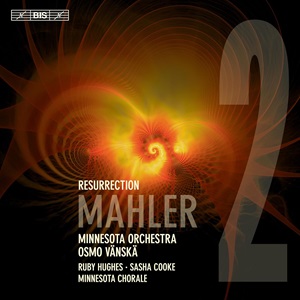
Gustav Mahler (1860-1911)
Symphony No 2 ‘Auferstehung’ (1888-1895)
Ruby Hughes (soprano), Sasha Cooke (mezzo-soprano), Minnesota Chorale, Minnesota Orchestra/Osmo Vänskä
rec. 2017, Orchestra Hall, Minneapolis, USA
Reviewed as lossless 96 KHz / 24-bit download.
BIS BIS-2296 SACD [84]
The Second Symphony was the first of Mahler’s oeuvre I became acquainted with in my university years. A friend played Bruno Walter’s CBS recording on LP. I remember I was bored stiff for what seemed like an age; I was still a three-minute-attention-span listener. Then the finale woke me up. Since then, in any new recording, it is the last 30 minutes I play first. When in concert, I slowly become more and more anticipatory of the finale.
I abandoned such hedonism here, and listened from beginning to end, marvelling at the sheer sound that emerged from my stereo speakers. The listener seems to be positioned well back from the musicians. I assume there were few microphones. I hear no spotlighting of instrumentalist or singers, except a little for Sarah Cooke in Urlicht. Generally speaking, I think that Osmo Vänskä presents a very straightforward view of the work. He observes portamento to emphasize his particular interpretation without lurching into extremes. There is a notable increase in tension as the first movement progresses, and one can almost feel how the orchestra responds to Mahler’s original description of the music as Todtenfeier (death ceremony).
Urlicht, the first vocal movement, is Mahler’s setting of O Röschen rot (o little red rose) from the song cycle Des Knaben Wunderhorn. Sarah Cooke, whom I have not heard before, sings exquisitely. It was only when the choir entered that I began to have doubts. The lovely voice of Ruby Hughes soars beautifully, but the loud cry Aufersteh’n, ja aufersteh’n sounds remarkably bass-light. The choir, balanced naturally, seems to be slightly overpowered by the orchestra when everyone is working full tilt. When I finished listening to the mighty ending, I was very impressed by the BIS engineers’ ability to capture huge forces – what with sundry percussion including tam-tam, bass drum and organ to contribute to the tumult.
But my observations about the lower end of the choir’s vocal spectrum remained, so I took out two recordings: the 1975 account by Zubin Mehta leading the Vienna Philharmonic and the Vienna State Opera Choir (review), and the much-lauded 2009 live recording from the Festival Hall by Vladimir Jurowski and London Philharmonic Orchestra (review).
What a shock! In the Mehta recording, I was instantly struck by the now very obvious multi-miking that Decca’s engineers applied, and the more up-front balance for all concerned in the recording. My memory had not played me false. There was much more presence for the bass members of the choir. But the vintage Decca sound is still excellent. (Had it not been for the BIS recording fresh in my aural memory, I would not have noticed the recording techniques.)
Feeling somewhat nonplussed, I turned Jurowski’s version. I do not quite recall why I bought it; there must have been a great review somewhere. Now, I played Vänskä’s recording again. With the finale ringing in my ears, I put on the LPO disc.
The shock was even greater. The concert took place in the somewhat problematic acoustic of the Festival Hall. The evidently very skilled engineers of K&A Productions have decided to build a sumptuous, very close-up recording, with the choir prominently balanced. Somehow they have managed to give the orchestra a huge presence as well. The close-miked technique minimized audience noise (except for the idiot who screams within a split second of the ending, then joined by the rest of an enthusiastic audience). It is impossible to compare adequately the two choirs, the relatively distantly recorded Minnesota group and the in-your-face, apparently gigantic LPO chorus. One thing is sure for me. The listening experience is exciting, but sonically very artificial.
The download comes with very detailed notes in English, German and French.
Jim Westhead
Previous reviews by John Quinn (March 2019) and Dave Billinge (March 2019)
Buying this recording via a link below generates revenue for MWI and helps us keep free access to the site




















